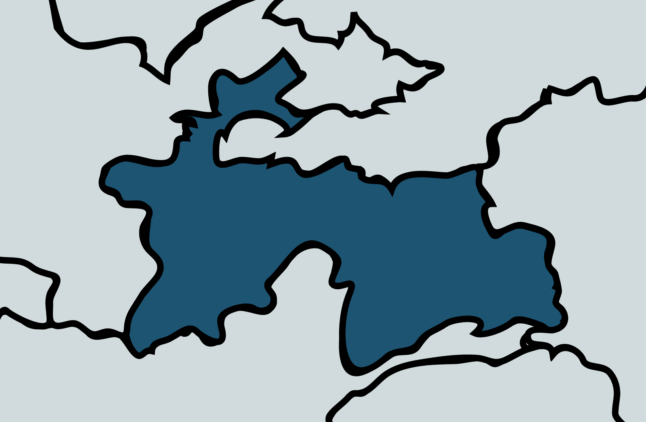IRPT Leaders

The Islamic Renaissance Party of Tajikistan (IRPT) was one of the most popular opposition parties in Tajikistan until it was banned in 2015. A dozen senior IRPT leaders are currently serving prison sentences ranging from 14 years to life for their association with the party and outspoken criticism of the government.
In early 2015, the Tajikistani government initiated a campaign to discredit and dismantle the IRPT. Shortly before the March 2015 parliamentary elections, several news articles appeared in state-run newspapers that accused the IRPT of terrorism and that the nearly 500 Tajik fighters in Syria had ties to the IRPT. Imams at state-controlled mosques also delivered sermons, which were reprinted in newspapers, denouncing the IRPT and its link to terrorism.
The campaign did not end after the IRPT only received 1.5% of the vote in the March 2015 elections and lost both of its seats in parliament. Articles in state-controlled newspapers continued to claim the IRPT was linked with ISIS and did so until the Justice Ministry issued a proclamation that ordered the party to close and banned it from operating. Ostensibly, the reason for the ban was that IRPT’s membership had fallen below 1,000 and thus it no longer met the requirements of a political party under Tajik law. The ban itself was announced in an article by the Justice Minister entitled “Warning on the Termination of the Illegal Activities of the [IRPT]” and published by the state news agency. A day after the ban, a spokesperson from the Interior Ministry claimed that those IRPT members had been in direct contact with ISIS members and that several IRPT members had been arrested after raising the ISIS flag. These accusations were never substantiated.
A week later, General Abduhalim Nazarzoda, the deputy defense minister, was accused of plotting a coup which resulted in the deaths of at least 35 people. The government claimed Nazarzoda was associated with IRPT, but failed to produce any evidence to support this accusation.
Most of the senior IRPT leaders were arrested on September 16, 2015 after they were accused of participating in the failed coup organized by General Nazarzoda, but the government failed to provide any evidence that any IRPT members were involved. Those arrested include Saidumar Husaini, Muhammadali Faizmuhammad, Rahmatulloi Rajab, Zubaidulloi Roziq, Vohidkhon Kosidinov, Sattor Karimov, Kiyomiddin Kuramdzhonovich Avazov, Abduqahar Davlatov, Hikmatulloh Sayfulloza, Sadidin Rustamov, Sharif Mamadalievich Nabiev, and Abdusamat Ghayratov. Relatives of the detained activists informed human rights groups that the detainees were subject to torture and kept incommunicado.
On September 29, 2015, the Supreme Court issued a ruling which banned the IRPT. In its ruling, the Supreme Court determined that the IRPT should be labeled as a terrorist organization, despite the lack of evidence linking it to any terrorist activities. To this day, the distribution of any newspapers, videos, audio recordings, literature and leaflets connected to the IRPT is prohibited.
On February 9, 2016, the Supreme Court began hearing cases against the IRPT leaders. Because the charges involved national security concerns all hearings were closed to the public and took place in the Tajikistani State Committee for National Security pre-trial detention facility in Dushanbe rather than in a courtroom. Lawyers for the defendants were arrested before the proceedings could begin. Subsequent lawyers were deported from the country.
The charges against the IRPT leaders included terrorism, armed rebellion, murder, public appeals to “violent change of the constitutional order,” incitement to racial and religious hatred, and organization of a criminal group. Despite the lack of evidence, on June 2, 2016, the Supreme Court of Tajikistan sentenced the 12 IRPT leaders to sentences ranging from 14 years to life in prison.
On May 19, 2019, a deadly riot broke out at a prison in the city of Vahdat, where many of the IRPT leaders are held. One of the IRPT leaders –Sattor Karimov –was killed, allegedly by members of ISIS. At least two other IRPT members were killed in the violence and several more received serious injuries.
Two days later, Freedom Now and Hogan Lovells filed a petition with the UN Working Group on Arbitrary Detention on behalf of the IRPT leaders. In November 2019, the Working Group issued an opinion finding the detention of the activists to be in violation of international law.
Freedom Now has called on the European Council to raise the imprisonment of the IRPT leaders and detailed the case in a report to the Human Rights Committee prior to Tajikistan’s periodic review in June 2019 and in a submission to the UN Human Rights Council for Tajikistan’s Universal Periodic Review in March 2021.
Related News Posts
-
Tajikistan: UN Declares Detention of Opposition Party Leaders in Violation of International Law
February 11, 2020 -
Tajikistan: Letter to European Council President Donald Tusk
May 28, 2019 -
Tajikistan: Freedom Now Files Petition with UN on behalf of Political Opposition Leaders
May 21, 2019 -
Tajikistan: Political Opposition Members Killed in Prison Riot
May 20, 2019 -
Tajikistan: European Union Must Ensure Tajikistan Respects Human Rights
July 23, 2018 -
Blog Post: OSCE Members Must Condemn Human Rights Abuses in Tajikistan
September 11, 2017 -
Tajikistan: UN Secretary-General Should Raise Issue of Political Prisoners
June 9, 2017
Enforcing the Rule of Law
Submission to the UN Human Rights Council
March 9, 2021Opinion of the UN Working Group on Arbitrary Detention
November 19, 2019Petition to the UN Working Group on Arbitrary Detention
May 21, 2019Report to the UN Human Rights Committee
June 8, 2019
Donate Today and Help Free a Prisoner of Conscience
Can you imagine a doctor being imprisoned just for treating a patient, or a journalist detained simply for publishing an article critical of his government?
